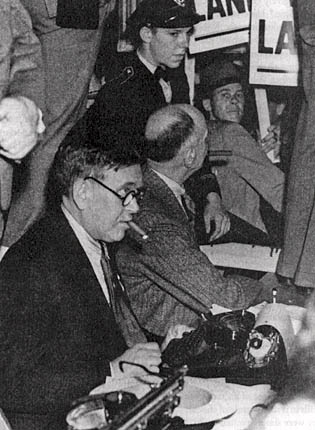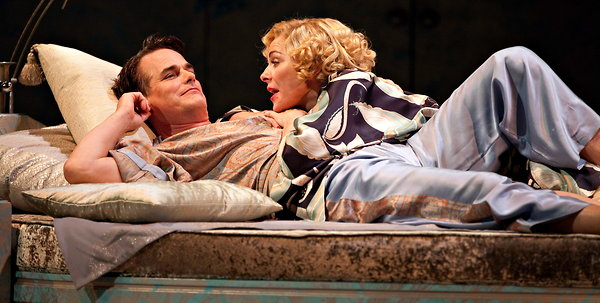A rare kinescope of Stan Getz playing excerpts from Eddie Sauter’s Focus, as originally telecast on The Edie Adams Show in 1963:
(This is the latest in a weekly series of arts-related videos that appear in this space each Wednesday.)
Terry Teachout on the arts in New York City
A rare kinescope of Stan Getz playing excerpts from Eddie Sauter’s Focus, as originally telecast on The Edie Adams Show in 1963:
(This is the latest in a weekly series of arts-related videos that appear in this space each Wednesday.)
“George Abbott later told me that no matter what part you’re playing, the audience makes up its mind when you first step onstage, before you speak, whether it likes you or not.”
Edie Adams and Robert Windeler, Sing a Pretty Song…
“Even the worst of us would like to change, like at least to think–and talk–of becoming better; the attentions of our reformers are so flattering, and at no other time is the ascending path tripped so lightly as when we are in love.”
Sybille Bedford, A Legacy
 Oscar Wilde claimed to have put all his genius into his life, leaving only his talent for his work. Many a great conversationalist has done much the same thing. Most people (though not all!) find it easier to talk than to write, and some, like the now-forgotten Desmond MacCarthy, talk so well that they never manage to write anything memorable.
Oscar Wilde claimed to have put all his genius into his life, leaving only his talent for his work. Many a great conversationalist has done much the same thing. Most people (though not all!) find it easier to talk than to write, and some, like the now-forgotten Desmond MacCarthy, talk so well that they never manage to write anything memorable.
For the professional writer, blogging is an intermediate state. It’s writing, but writing of a peculiarly ephemeral kind, the postmodern equivalent of penning a thrice-weekly newspaper column, and those who do it too assiduously run the risk of dribbling away the stuff books are made of. Hilaire Belloc once managed to finesse a similar problem by publishing a collection of more than usually ephemeral essays called On Nothing and Kindred Subjects, but the fact that On Nothing is now as forgotten as Desmond MacCarthy suggests that he was kidding himself.
I’ve been blogging more or less regularly since 2003, during which time I’ve also published more than six hundred columns in The Wall Street Journal and written three books, two opera libretti, and a play. I’m not sure what this means, if anything, but at the very least it suggests that I find blogging stimulating. Usually it is, but there are times when all my talent (I have no genius) goes into my work, leaving nothing left over for the blog.
Having suspected from the outset that this might happen, I resolved to keep the ball rolling by posting a pointed quotation each day. Two thousand almanac entries later, I find that the choosing of this daily quotation is one of the self-imposed duties that I enjoy most. Between the almanac, the Thursday theater guide, the teasers for my Wall Street Journal columns, and the art-related videos that I now post twice weekly, I like to think that “About Last Night” is worth visiting even when I have nothing else to say other than that I have nothing else to say.
 I’m not telling you anything that you don’t already know when I confess that I haven’t had all that much to say in recent months, a fact that is amply explained by what’s been happening to me during that time. Between the premieres of my second opera and first play, the continuing illness of my mother, and my endless theater-related travels, I’ve been finding it increasingly difficult to blog.
I’m not telling you anything that you don’t already know when I confess that I haven’t had all that much to say in recent months, a fact that is amply explained by what’s been happening to me during that time. Between the premieres of my second opera and first play, the continuing illness of my mother, and my endless theater-related travels, I’ve been finding it increasingly difficult to blog.
This, too, shall pass, and until it does, I mean to continue posting the usual quotations and videos, keeping you abreast of my various print-media appearances and professional activities, and updating the right-hand column at reasonably frequent intervals. I’ll also continue to tweet my random thoughts on the passing scene, and I’ll write should the spirit move me, as it doubtless will from time to time.
What I won’t do is bore you by making constant excuses for not blogging more often. You can henceforth take it for granted that I wish I were doing so–and that I’ll be back on the case as soon as possible.
Chuck Jones’ “Double or Mutton,” written by Michael Maltese:
“The moment ‘talk’ is put into print you recognize that it is not what it was when you heard it; you perceive that an immense something has disappeared from it. That is its soul. You have nothing but a dead carcass left on your hands. Color, play of feature, the varying modulations of voice, the laugh, the smile, the informing inflections, everything that gave that body warmth, grace, friendliness, and charm, and commended it to your affection, or at least to your tolerance, is gone, and nothing is left, but a pallid, stiff and repulsive cadaver.”
Mark Twain (quoted in Edward Bok, The Americanization of Edward Bok)
In today’s Wall Street Journal I review the Broadway revival of Private Lives. Here’s an excerpt.
* * *
Throughout most of his life, Noël Coward was widely regarded as a theatrical lightweight, albeit a brilliant one. Not until the ’60s did the critics start to figure out that “Private Lives,” his masterpiece, was something more than (in his own ironically self-deprecating words) “a reasonably well-constructed duologue for two experienced performers, with a couple of extra puppets thrown in to assist the plot and to provide contrast.” Needless to say, Coward knew better, and now so do we. Yes, “Private Lives” is a comedy–one of the funniest ever written–but beneath its slapstick lunacy and impish repartee, it preaches a stealthy sermon about hypocrisy that is as much to the point today as it was in 1930. Elyot, the playwright’s fictional alter ego, gets right to the heart of the matter when he tells Amanda, his ex-spouse and companion in adultery, to laugh at “the futile moralists who try to make life unbearable….Flippancy brings out the acid in their damned sweetness and light.” Indeed it does, and you don’t have to be an anarchist to smile wickedly as Coward’s characters poke bruising fun at all the censorious prigs, both moral and political, who talk a better game than they play.
 Such artful tutorials deserve to be seen regularly. Alas, it’s been nine years since “Private Lives” was last performed on Broadway, but that production, which starred Lindsay Duncan and Alan Rickman, was so good that playgoers are still buzzing about it. Not since then has there been a first-rate big-ticket Coward revival in New York, which explains part of the general interest in the new “Private Lives” that just sailed in from London by way of Toronto. Most of it, though, arises from the onstage presence of Kim Cattrall, lately and famously of “Sex in the City,” who plays Amanda. In New York that may sound like stunt casting of the worst kind, but Ms. Cattrall is well known in England as a serious stage actress. She is not, however, an ideal Amanda…
Such artful tutorials deserve to be seen regularly. Alas, it’s been nine years since “Private Lives” was last performed on Broadway, but that production, which starred Lindsay Duncan and Alan Rickman, was so good that playgoers are still buzzing about it. Not since then has there been a first-rate big-ticket Coward revival in New York, which explains part of the general interest in the new “Private Lives” that just sailed in from London by way of Toronto. Most of it, though, arises from the onstage presence of Kim Cattrall, lately and famously of “Sex in the City,” who plays Amanda. In New York that may sound like stunt casting of the worst kind, but Ms. Cattrall is well known in England as a serious stage actress. She is not, however, an ideal Amanda…
For starters, Ms. Cattrall lacks the silken lightness of touch necessary to play Amanda convincingly. Paul Gross, her Elyot, has it in abundance, which is why he gets most of the laughs. Not only does he know how to flick off his lines with sly casualness, but he does it without imitating Coward’s style of acting, which makes his performance all the more effective. He and Ms. Cattrall have terrific onstage chemistry, and their romantic scenes couldn’t be sexier, but whenever the tone of “Private Lives” turns comic, her overemphatic, inadequately varied delivery undercuts the humor.
Just as important, Ms. Cattrall, who makes no secret of being 55, has been cast as a thirtyish beauty in a play about the “bright young things” of whom Coward himself was a prime example. When “Private Lives” opened in 1930, he was 30 and Gertrude Lawrence, his co-star, was 32, and their self-evident youth was central to the play’s effect. Ms. Cattrall, to be sure, looks gorgeous, but she doesn’t look 30, and the fact that the play has been recast to accommodate her age–Mr. Gross is 52–distorts it still further…
* * *
Read the whole thing here.
Noël Coward and Gertrude Lawrence in an excerpt from the balcony scene of Private Lives, recorded in 1930. (The video has no relation to the recording!)
UPDATE: To hear Gertrude Lawrence and Orson Welles in a heavily abridged 1939 Campbell Playhouse radio adaptation of Private Lives, go here.
“Surely that little pseudo-gothic church on Broadway, hidden amongst the skyscrapers, is symbolic of the age! On the whole face of the globe the civilization that has conquered it has failed to build a temple or a tomb.”
André Malraux, Voices of Silence
| M | T | W | T | F | S | S |
|---|---|---|---|---|---|---|
| 1 | 2 | 3 | 4 | 5 | 6 | |
| 7 | 8 | 9 | 10 | 11 | 12 | 13 |
| 14 | 15 | 16 | 17 | 18 | 19 | 20 |
| 21 | 22 | 23 | 24 | 25 | 26 | 27 |
| 28 | 29 | 30 | ||||
An ArtsJournal Blog